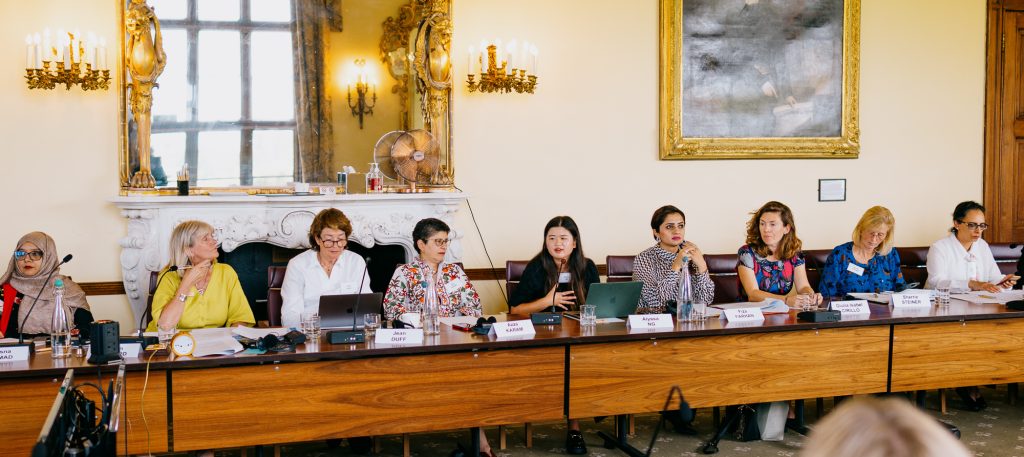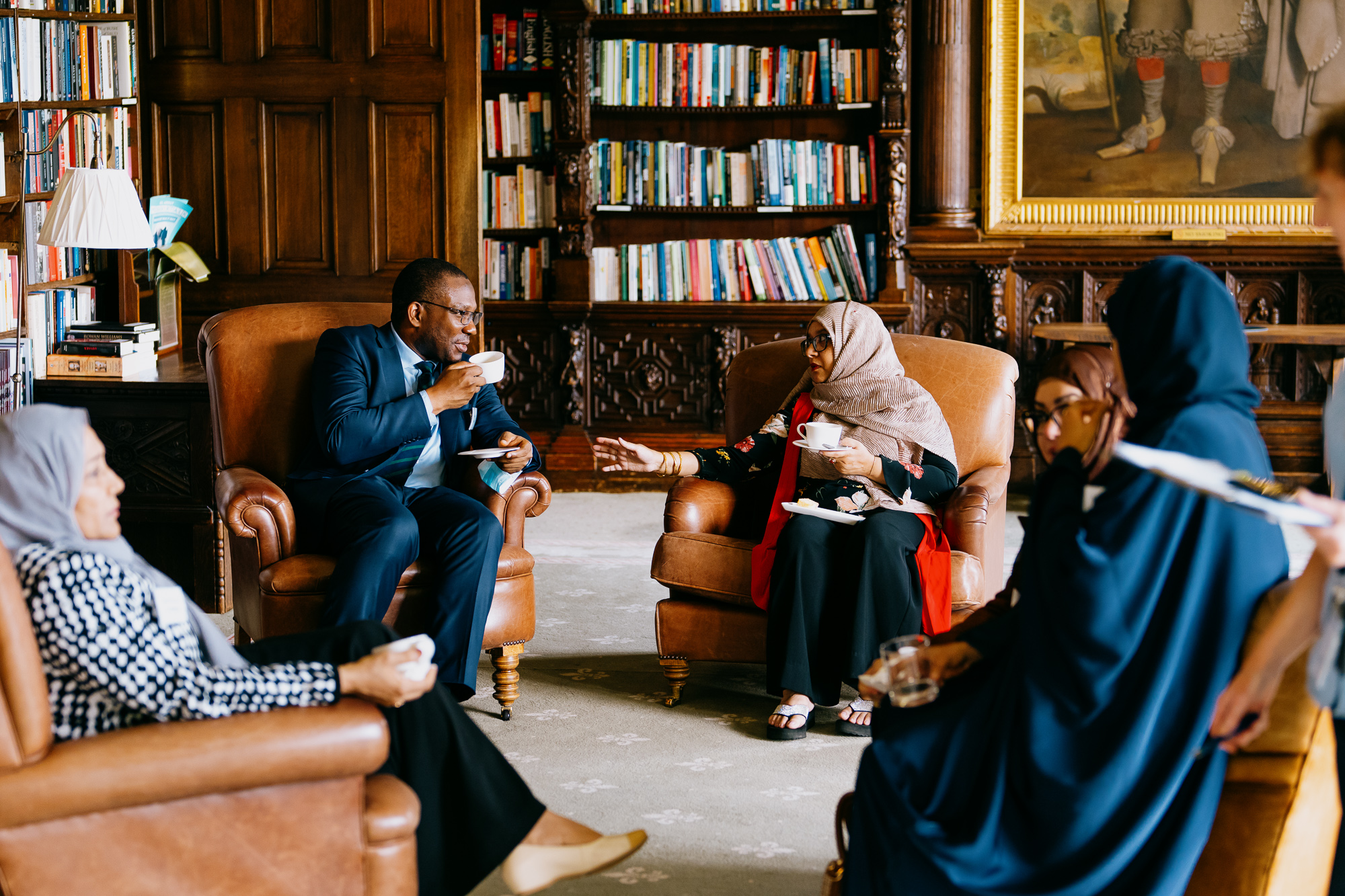In partnership with the Doha International Centre for Interfaith Dialogue, Global One, the Qatar Ministry of Environment and Climate Change, the Partnership for Faith and Development, the International Learning Movement UK and The Stirling Foundation
Preface
By Dr Husna Ahmad OBE and Jean Duff
It has been our honour to curate this event from concept to reality in partnership with Wilton Park and the Doha International Centre for Interfaith Dialogue [DICID]. We are at a critical moment in time where we are facing the triple planetary crisis and yet the substantial influence and power of women – both faith-inspired and secular– remains largely disconnected from the activities and advocacy being led by other stakeholder communities. In exploring the nexus between faith, gender and climate change we have identified a series of recommendations to scale up radical collaboration among women of faith, and between them and secular women’s, youth and indigenous peoples’ movements.
We could not have chosen a better partner than Wilton Park with its experience in managing and facilitating sensitive conversations and its strong institutional connections to the UK Government’s Foreign, Commonwealth and Development Office, FCDO.
Our process facilitated a deep dialogue about possibilities for scaling up impact on climate goals among women leaders and their male allies, representing 15 countries including the global south. Whilst we have just begun to scratch the surface at this event we can see the beginnings of a radical collaboration within a framework which is broad and comprehensive. We pray that the diverse and specific action recommendations proposed by the participants develop into a concerted effort for harnessing the influence of women of faith globally for urgent impact on climate and biodiversity goals.
Acknowledgements
We wish to recognise the huge contribution to the success of this event both financial and substantive by our partner the Doha International Centre for Interfaith Dialogue [DICID], the Ministry of Environment and Climate Change, Qatar and the Embassy of Qatar to the United Kingdom. We also recognise our partners International Learning Movement ILM, UK; and Stirling Foundation, USA who have also been generous with their time and financial support.
We wish to acknowledge particularly the wonderful input, time, commitment and creativity and tireless efforts of the following individuals: HE Dr Ibrahim Al Naimi, Alison Hilliard, Wendy Head, Jordan Coates, Ines Belliard, Abbie Holford, Nadia Al Ashqar, Dr Sekou Marafe Toure, Cindy Orvin and Zahra Ahmad.
Background
The June 2022 UNFCCC report clearly highlighted how women are influencing climate change. The report draws attention to the interplay of gender and social norms that results in women being more vulnerable to climate change impacts than men, while emphasising the important role that women and marginalised groups can play in mitigating and adapting to climate change. It discusses how allowing women and marginalised groups who participate in decision-making can contribute to the development and implementation of effective and durable climate-resilient policies.
While we recognise the widespread engagement of faith actors with the climate change agenda, we also see how siloed climate action is within and between the faith and secular ‘worlds’. The urgency and scale of the need insists that we examine what more we can do together. We believe greater collaboration across sectors will accelerate climate action, and that women’s powerful influence and leadership is key to going further, faster.
Women are leading climate action at the national and local levels, as well as in religious and secular contexts, in areas including education, food security, social and behavioural change, policy advocacy, innovative financing, communications, sustainable environment, access to clean energy, and more.
Vast climate action is being undertaken across the world within religious, indigenous, women’s and youth ‘worlds’. But it is plainly not enough.
This event was carefully curated at the beautiful building and grounds of Wilton Park bringing together 46 women leaders and their male allies for a three-day residential meeting to discuss the critical question of how to scale up women’s leadership and impact at the nexus of climate change and faith.

Mary Robinson enunciated our rationale clearly:
“We are on the cusp of a catastrophe and efforts are often siloed, and separated by politics, profit, culture, resource limitations, and even plain old competition. We now need women to lead by changing behaviour in the family, in the community and in the country. We need women to act and lead locally, nationally and internationally. And these actions will make a difference. Working together we can make a difference. We need to work together to move faster and further on climate change because we’re not winning this battle for a clean energy, safe climate world. This is on our watch now and we must do it.”
-
“We need to be attentive to the kind of leadership we need. This is about the leadership of listening, and about giving hope and inspiration. It’s about putting community, compassion and inclusivity at the heart of all we do”
The idea for this event was originally conceived by Jean Duff and Husna Ahmad and developed with Wilton Park and the Doha International Center for Interfaith Dialogue [DICID].
Jean Duff and Husna Ahmad are two women leaders who have been forging SDG-related multi-faith and cross-sectoral collaborations at the community, national and international level for over thirty years. Both women took part in the 2022 ’17 Rooms’ process, an initiative of the Rockefeller Foundation and the Brookings Institution which resulted in a series of recommendations to scale up collaboration between the religious and secular worlds for impact on climate goals. Experts in the ‘Room 17’ process identified four areas with potential for near-term impact, including the empowerment of women leaders and closer collaboration between women of faith and women leaders in secular contexts.
The objectives of this meeting were:
- Strengthen collaboration and forge collaborations between religious adherents and committed individuals and women leaders, civil society groups, and human rights organisations on climate change issues.
- Facilitate women leaders joining forces across sectoral lines —linking women of faith networks with women leaders in secular contexts.
- Create a cultural and scientific platform for discussing relevant issues and providing a safe space for in-depth dialogue among climate actors in international institutions, academia, civil society, and the private sector, and inspiring, hopeful, and determined global and local leaders on climate, religious, and women’s issues.
- Align women’s leadership with the ongoing efforts of youth, indigenous people and others stakeholder groups
- Identify and plan specific upcoming advocacy moments to amplify the voices of women on climate action
Our process for this meeting was designed to surface specific actions and strategies that will support collaboration and move climate action further and faster. Participants explored how faith can add value and how best to bridge the divides, the territorialities, lack of resources and visibility, and how to collaborate for impact on a much larger scale.
Whilst this report is one of the outcomes from the meeting, the meeting itself surpassed our expectations and went beyond our other expected outcomes which were:
1. A cohort of women leaders and male allies bonded in friendship through the exchange of ideas, and their affirmations of common cause and common action
2. Greater visibility at UN ‘moments’ of women’s leadership on key climate action advocacy strategies
3. Better joining up of often siloed environmental initiatives with specific plans to link women, youth, faith and indigenous led initiatives
4. Specific Plans for Joint action and communications –supporting each other’s campaigns
5. Present concrete plans for joint actions, build networks, and support the campaigns of active institutions.
6. Broadened base of support for ongoing climate action
The immediate prospect of a catastrophic climate crisis requires urgent strengthening of the scale and impact of action to achieve carbon emissions and biodiversity targets. Enlightened, effective leadership is needed now more than ever! Moreover, given the urgency and magnitude of the need, we must examine what more we can do together. We believe that greater cross-sector collaboration will accelerate positive climate action and that women’s strong influence and leadership are key to accelerating progress.
Pre-event material in the form of a concept note, agenda, participant biographies and briefing papers were provided so that participants could have some preparation for the discussion. The briefing papers were titled “Decarbonizing our Future, The Role of Finance and Subsidies” by Earth Ethics, and “Why Faith Matters in Women’s Advocacy around the Climate Crisis: Religion as Opportunity, not Obstacle” by the University of Birmingham, UK. Please see the annex to this report for the briefing papers.
A pre and post meeting survey was issued for the participants to provide anonymous feedback. We were very pleased to see the overall satisfaction among the participants with the event.
-
“Openness, collaborative & passionate spirit of participants – openness to new ideas, collaborative to solve problems and passion to find solutions to go even faster.” (Anonymous post-survey feedback)
-
‘The group that was assembled was great – diverse, committed and rich in experience – and that was a brilliant starting point for a powerful discussion.’ (Anonymous post-survey feedback)
